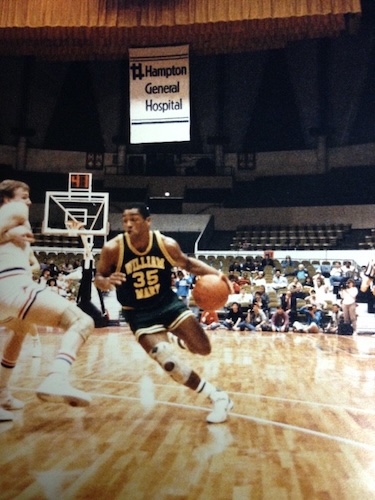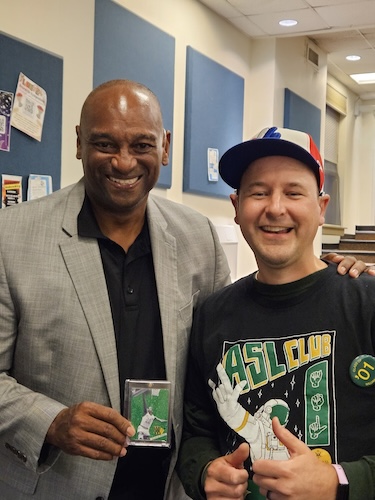Never, Ever Quit
Former MLB player Curtis Pride ’90 speaks to W&M ASL Club
June 4, 2025
By
Annie Powell M.A. ’18, Ph.D. ’24
“One of our greatest gifts as human beings is the ability to dream,” Curtis Pride ’90 told William & Mary students and alumni at an American Sign Language (ASL) Club event this spring. Inspiring attendees to always keep dreaming and never give up, Pride shared the story of his career as the first deaf baseball player in the modern major leagues, a story that also included four years as a standout basketball player at William & Mary.

Pride’s athletic abilities were obvious from a young age, and they weren’t limited to one sport. In 1985, he represented the United States in soccer at the first Under-16 World Cup in China (and was named one of the top 15 soccer players in the world). But in the U.S. in the 1980s, playing professional soccer was not the path to a lucrative athletics career. Besides, since he had first watched the NCAA Tournament as a child, Pride wanted to play college basketball. And he was a top MLB draft pick coming out of high school.
Balancing the intensity of his athletic pursuits was his father’s insistence that he attend college. “Dad called the teams that were interested and told them I was going to college no matter what,” Pride says. “Even if I were the first pick overall, I was going to college.”
Encouraged by his father, Pride negotiated a deal with the New York Mets, who had picked him in the 10th round of the major league draft: He would attend William & Mary, play basketball during the year and play in the minor leagues during the summer. For four years, his professional baseball career would exist solely between May 15 and Aug. 15.
At the ASL Club event on April 9, Pride shared lessons that he learned throughout his baseball career — “Never, ever quit, even when things are not going well for you” — and memories of W&M, including the camaraderie with teammates on and off the court. He also reminisced about those who made a major impact on his W&M career, including the late Carroll F.S. Hardy, who served as associate dean of multicultural affairs and then associate vice president of student affairs. “She promised me and my parents that she would never let me fail, and she was true to her word,” Pride says.
He grew discouraged after college that his career wasn’t advancing as quickly as he hoped and came close to quitting baseball. With a degree in finance from William & Mary, Pride had options if he wanted to change directions. But after working in a special education classroom with students who discovered that he also played professional baseball, he came to a realization: “What kind of message would I be sending to them if I give up my dream? I can’t let these kids down.”
Refusing to quit, Pride kept working on his game and signed with the Montreal Expos in 1993, starting a career in the majors that would include 421 games over 11 years. After retiring from professional baseball, he spent 15 years as the head baseball coach at Gallaudet University in Washington, D.C., the country’s leading university for deaf and hard-of-hearing students. Pride then returned to the major leagues as an ambassador for inclusion, traveling across the country, meeting with all 30 MLB teams and finding ways to enhance the ballpark experience for fans with disabilities. At the ASL club meeting, he signed copies of his new book, “I Felt the Cheers.”

Ella Briggs ’25, who served as president of the W&M ASL Club until her graduation this month, admires Pride’s advocacy work as much as his athletic prowess. “It’s really cool to see the work he’s done for the disability community, in addition to his amazing career and athletic legacy,” she says.
The ASL Club, co-founded by Philip Woodward ’01, J.D. ’04, is a community of about 15-20 students interested in learning not only how to sign, but also about the Deaf community.
“To my knowledge, no one in the club is deaf or hard of hearing,” says Bella Strong ’25, the club’s most recent secretary. “A lot of what we do is raise awareness. There’s been so much about accessibility and Deaf history and Deaf education that I didn’t know about before, which is a huge value to the club.”
The club’s weekly meetings are separated into two parts, starting with a “Culture Corner,” during which students discuss an aspect of Deaf culture. At the meeting before Pride’s visit, club members discussed Gallaudet University, where Pride coached the baseball team. The second half of the meetings are devoted to language learning.
“We try to make learning ASL fun, since we’re an informal club and not a class,” Briggs says. “We do our best to bridge the gap between approaching ASL as a serious language and also keeping it informal and fun.” One way the club encourages learning is by hosting silent dinners. Meeting on campus and at local restaurants, club members sign, rather than speak, throughout the meal.
Pride finished his presentation at the ASL club by reading a letter from a 12-year-old fan who had written to him while he was still playing baseball. She told Pride that she was legally blind but could still see a little bit. And though she couldn’t see home plate, her mom would tell her what was happening so that she could cheer for Pride. “You will always be my favorite player,” wrote the young girl. “Your friend, Amanda.”
After an emotional moment in the room, Pride told the group: “See, you always have an ability to make an impact on someone’s life.”
Note: Read more about Pride in the spring 2025 issue of the W&M Alumni Magazine, featuring the article “Major League Mentor.”